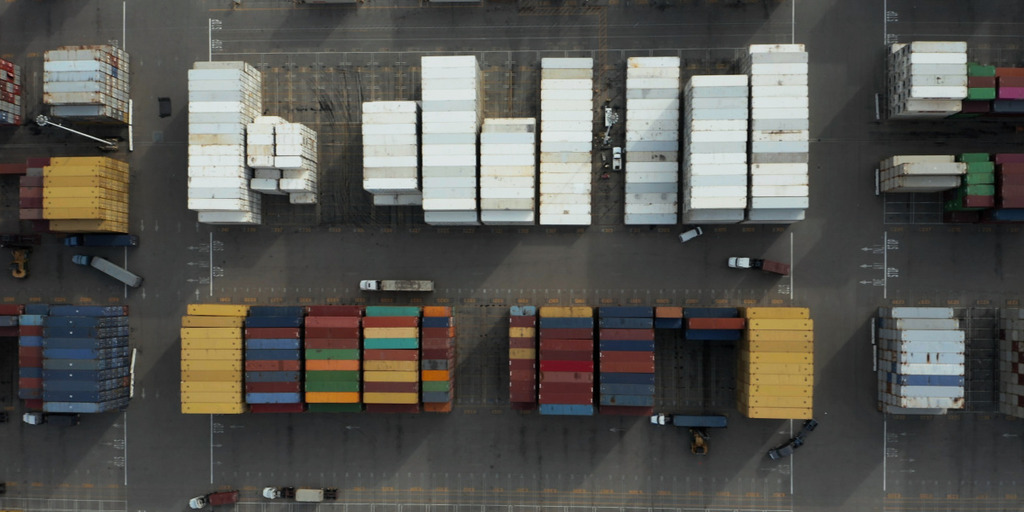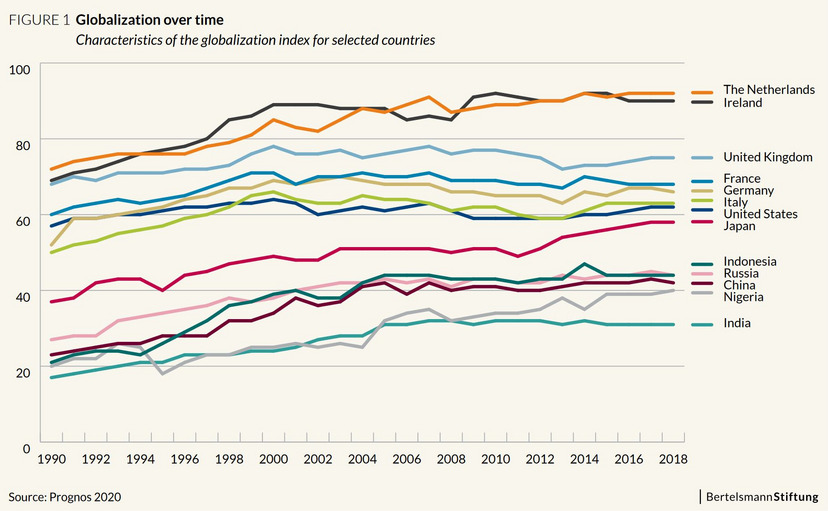The corona crisis is leaving deep marks on global commodity flows and value chains. The resulting decline in globalization is problematic because international trade and the worldwide division of labor have increased prosperity in many countries over the past nearly 30 years, in some cases significantly. This is the result of the calculations of Prognos AG for our new edition of the Globalization Report. Using a Globalization Index, the report measures the degree of international interdependence of 45 industrialized and emerging countries and, on this basis, calculates the direct economic gains resulting from globalization. All of the countries examined recorded globalization-induced increases in real gross domestic product (GDP) per capita between 1990 and 2018.

Tyler Casey / Unsplash - Unsplash License, https://unsplash.com/license
Protectionism is the wrong answer to Corona – Globalization increases prosperity
Globalization has increased the gross domestic product per capita in 45 countries between 1990 and 2018. As the Globalization Report 2020 shows, industrialized nations have achieved the greatest income growth. In relation to their income level, however, emerging economies are also among the winners. Current estimates show that the effects of the Covid-19 pandemic could partially cancel out the gains of globalization in Germany.

Bertelsmann Stiftung
Globalization over time: characteristics of the globalization indexfor selected countries
Both developed and developing countries are winners of globalization. In absolute terms, however, it is primarily developed industrial nations that have benefited from increasing globalization. The largest average real income gains per capita and year resulting from globalization in the period from 1990 to 2018 were recorded by Japan (around 1,790 euros), Ireland (around 1,610 euros) and Switzerland (around 1,580 euros). Germany ranks seventh with an average annual per capita gain of 1,110 euros.
Large emerging countries such as Brazil, Russia and China can be found at the lower end of the scale. The average, globalization-induced GDP gain here is only between 95 and 136 euros per year and inhabitant. The low absolute gains in these countries are primarily the result of the low starting level of GDP per capita at the start of the measurement in 1990. This is why industrialized countries that already had a high per capita income at that time perform better in terms of absolute gains.
Emerging economies are catching up
In relative terms, however, many emerging economies and young market economies are catching up rapidly. This momentum is reflected in the overall globalization-induced income gains achieved between 1990 and 2018 in relation to the real gross domestic product per capita in 1990. These income gains correspond to 618 percent in China. In other words, per capita income has risen more than sixfold in the past three decades as a result of increasing globalization alone. Next in line are South Korea (373 percent), Poland (366 percent), Hungary (352 percent) and Chile (339 percent). Germany ranks only in 23rd place here with a gain of 142 percent.
Social sustainability increased in more globalized countries
However, globalization must not only be evaluated in terms of its monetary gains, but also in terms of its consequences for social progress. In order to measure the connection between globalization and sustainability, the authors of the report have developed an index with a scale of 0 to 100, which is based on selected sustainability indicators of the United Nations' "Sustainable Development Goals". According to the calculations, social sustainability has increased in all countries under consideration during the period under review: from an average index value of 62 in 1990 to 81.5 in 2018 - an increase of 19.5 points.
At the same time, more globalized economies such as the Netherlands, Belgium and Ireland have a higher score for social sustainability than less globalized economies. The increases in GDP resulting from increasing globalization give states additional scope to improve the living conditions of their citizens. "More globalized states can use the gains of globalization to make progress in areas such as healthcare or education," explains Thomas Rausch, our expert on international relations. It is therefore all the more important, he says, that countries that have so far participated less in globalization should benefit more from it.
The industrialized nations should, for example, reduce imbalances and open their markets more to products from developing countries.
Thomas Rausch, expert on international relations at Bertelsmann Stiftung
"We are very concerned about the current isolationist tendencies"
As the calculations show, the world economy is clearly benefiting from globalization. "The answer to the economic distortions of the Corona crisis must therefore by no means be protectionism," says Thomas Rausch. However, it can already be observed that individual states are introducing additional trade barriers and reducing environmental standards. Rausch continued: "We are very concerned about the current isolationist tendencies. After all, the attempt to turn back globalization would be accompanied by a loss of prosperity for all countries."
It is still too early to calculate the effects of the global economic collapse caused by the corona pandemic in detail, as hardly any reliable data is available for the year 2020. In order to provide a clue, the authors of the study first examined, using Germany as an example, which indicators in the Globalization Index are affected by the pandemic - for example, through interrupted supply chains or a decline in tourism. As a next step, based on various forecasts by renowned institutions such as the OECD, they estimated how much these indicators will decline in value. Based on the adjusted Globalization Index score for Germany for 2018 (the last survey year of the Globalization Report), the globalization-related income growth for Germany was recalculated. According to the estimates, based on 2018, the pandemic would reduce the globalization-related income gains per German citizen by 100 to 500 euros for one year.
When it comes to the question of the appropriate response to the pandemic, Thomas Rausch considers it reasonable to review supply chains and reduce dependencies in sensitive industrial sectors. However, he also believes that globalization provides opportunities to better manage a crisis - for example, by enabling companies to respond to domestic supply or demand slumps. "Even in the corona-induced recession, decision-makers in business and politics should work to further improve the framework conditions and standards of globalization. For example, by advocating a fair reform of the world trade order. Because only an equal participation of all countries in free trade can ensure broad prosperity," emphasizes Rausch.
Additional information
The Globalization Report 2020 analyses the growth effects of globalization based on gross domestic product per capita for the period from 1990 to 2018. The report was compiled by Prognos AG on our behalf. A Globalization Index based closely on the KOF Globalisation Index of the Eidgenössische Technische Hochschule Zürich measures the development of globalization for 45 industrialized and emerging countries. The index includes aspects of social globalization (tourism, migration) and political globalization (institutionalized interdependence, foreign relations, etc.) in addition to indicators of economic globalization. These data can be used to determine an index value in the range between 0 and 100 for each country and year. The higher this index value, the greater the respective country’s integration with other countries. An increase of the globalization index value by one point will raise the growth rate of real GDP per capita by around 0.3 percentage points.



